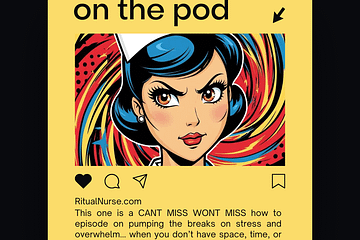Empowering Nurses: Prioritizing Mental Health, Resilience, and Career Growth
As nurses, we often hear the phrase “caregiver fatigue” tossed around in meetings and conferences, a term that’s become synonymous with our line of work. And rightly so, considering the emotional, physical, and psychological toll nursing can take on even the most resilient among us. But there’s more to the story—a deeper opportunity for change, empowerment, and transformation within our profession. Today, let’s explore how nurses can be proactive in improving their mental health, balancing their demanding work lives, and enhancing resilience while thriving in their chosen career paths.
Embracing Mental Health as a Non-Negotiable
First, let’s dispel a myth that has long infiltrated the nursing world: that putting your mental health first is selfish. Far from it. Prioritizing mental health is a bold step toward ensuring that you show up for your patients, colleagues, families, and—most importantly—yourself as your best version. Stigmatizing self-care as a weakness has no place in modern nursing, and it’s high time we rewrite that narrative.
Research from trusted organizations like the American Nurses Association (ANA) supports the overwhelming evidence that burnout, anxiety, and depression are prevalent among healthcare professionals, especially nurses. These mental health challenges not only affect the quality of care we provide but also increase the risk of poor job satisfaction and high turnover rates. A key question becomes: What are we doing about it as individuals?
Start by carving out daily practices that promote mental well-being—even if only in small doses. Deep breathing exercises before, during, or after your shift, even for five minutes, can signal your brain to switch out of survival mode. Journaling your thoughts at the start or end of each day can help process emotions and clear mental clutter. Practice mindfulness—whether it’s through yoga, meditation, or even pausing for a mindful cup of coffee. These may seem like cliché activities, but consistent practice yields transformational results.
Most importantly, don’t hesitate to seek professional help when needed. Therapy, counseling, or even peer support groups (designed specifically for nurses) can serve as lifelines during particularly challenging seasons of life. Empowerment begins by taking that first step toward investing in your own mental health.
Redesigning Work-Life Balance
Work-life balance is more than scheduling your shifts and breaks strategically—it’s about building an ecosystem of habits, relationships, and boundaries that support a sustainable career. There is a powerful concept in ‘owning your value’. In the context of nursing, this means recognizing that while the work we do is essential and life-affirming, our personal lives are equally, if not more important, too.
Here are a few key strategies to help redesign your work-life balance:
1. Set Your Boundaries:
It’s okay to say “no.” Whether it’s skipping overtime when you’re already stretched too thin or declining to participate in optional after-hours work activities, standing firm in your boundaries is a form of self-respect. You deserve to protect time for rest and recreation without guilt.
2. Outsource Where You Can:
In your personal life, consider delegating or outsourcing activities that eat into your downtime without fueling joy. For example, meal prep services, grocery deliveries, or hiring a house cleaner every few weeks can take a tremendous mental load off.
3. Clarify Your “Non-Negotiables”:
What activities or relationships fill your soul? Let these serve as your compass when designing your life away from the hospital or clinic. Maybe it’s ensuring you never miss your child’s soccer game, carving out Saturday mornings for a hike, or dedicating 20 minutes nightly to reading a good book. These non-negotiables are your personal anchors.
4. Unplug and Disconnect:
Create rituals to signal a “hard stop” between work and personal time. Whether it’s immediately changing into casual clothes after a shift, taking a short walk to clear your head, or limiting screen time, these small actions can help delineate between professional responsibilities and personal space.
Thriving Amid Challenges
There is an emphasis on resilience—not just getting through adversity but thriving in spite of it. Nurses deal with high-pressure scenarios daily, from managing grief to making split-second, life-saving decisions. A practice of leaning into resilience can quite literally rewrite how you experience stress and setbacks.
But thriving as a nurse doesn’t mean suppressing challenges; it means processing them and finding meaning through them. Here’s how you can integrate resilience-building practices into your routines:
1. Practice Gratitude:
As nurses, we’re often at the forefront of witnessing the fragility and miracle of life. Keeping a gratitude journal to record three things you’re thankful for daily can realign your focus to what’s going well, even on the toughest days.
2. Decompress in Healthy Ways:
While some may instinctively lean on food, alcohol, or binge-watching escapism for stress relief, more sustainable options include exercise, engaging in hobbies, or connecting with loved ones. Healthy decompression creates fewer emotional costs down the road.
3. Celebrate Small Wins:
This simple yet transformative practice isn’t just good for your mental health—it helps foster a positive organizational culture. Congratulate yourself for successfully managing a difficult patient case, completing a challenging shift, or simply taking the time to care for your own well-being.
Building Professional Skill Sets with Intention
There’s no empowerment quite like feeling confident and proficient in your skills as a nurse. Competence and continuous learning fuel pride, professional longevity, and fulfillment. The nursing profession offers countless ways to grow, and it’s our responsibility to seize those opportunities intentionally.
Consider creating a personal professional development plan:
– Specialize: Is there a particular area of nursing (like ICU, pediatric care, or oncology) that excites you?
– Certifications: Explore certifications that align with your interests and elevate your knowledge base. This could range from clinical specialties to leadership-focused credentials like Nurse Executive Certification.
– Mentorships: Don’t underestimate the value mentors bring. Seek out mentors willing to share expertise, provide insights, and support you on your professional journey.
A great resource for exploring these opportunities is the ANA’s website, which often features certifications, upskilling programs, and leadership opportunities. You can find useful updates in nursing professional development here.
Nurses as Masters of Personal Healing
Lastly, let’s talk about empowerment through personal healing. We cannot pour from an empty cup, yet so many nurses try to do just that. Healing your own emotional wounds, addressing unresolved traumas, and creating space for personal growth isn’t indulgent—it’s point-blank necessary.
Lean on therapy, spiritual practices, or a trusted community to dig deep into your own healing journey. Personal transformation is a willingness to dismantle—and rebuild—mental patterns that no longer serve us. Allow yourself the freedom to evolve—not just as a caregiver, but as a whole person.
I encourage you to view this part of your life as the most critical prescription you’ll ever fill: one for self-compassion, self-respect, and self-love.
In conclusion, nurses are not only caregivers but also leaders, learners, and ultimate sources of both healing and resilience. By tending to your own garden of mental health, work-life balance, professional growth, and personal healing, you not only thrive as a nurse but as a deeply balanced individual ready to meet life on your own terms.
Let’s continue to support one another on these journeys. You are not alone, and your well-being is worth every moment of attention.
For more inspiration, I recommend checking out our podcast, The Ritual Nurse, as well as exploring other trusted nursing education resources.
Let’s make empowerment the standard in our profession—not the exception!



